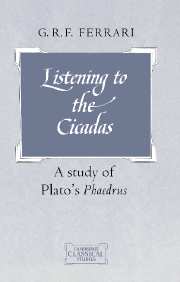3 - The critique of pure rhetoric
Published online by Cambridge University Press: 12 March 2010
Summary
Back to the orators
In the preceding chapter, I began considering Lysias' speech as a sample of rhetoric but ended by looking on Socrates' speeches as a swatch of philosophic rather than rhetorical method, and setting it against the whole cloth of the dialogue rather than of its critique of rhetoric alone. In this I followed in Socrates' footsteps. But this course strikes Phaedrus as beginning to drift. He agrees that Socrates has given a fair account of dialectical method; but is unsure of what has happened to the account of rhetorical method which they originally set out to provide (266c7–9). He is right, in a sense, to bring Socrates up short in this way; for Socrates has apparently digressed from examining the love-speeches purely for their rhetorical qualities in order to dwell on a dialectical technique that his own speeches exemplified, and even that only ‘by chance’ (265c9).
But what Phaedrus misses is, as it were, the drift of Socrates' drifting; for Socrates has been illustrating the fact that whereas the rhetorician has two voices – that of teacher, and that of practitioner – the philosopher has only one. In other words: despite the stylistic disparity of his poetic speeches on love and their subsequent appearance as examples in his sober account of dialectical method, Socrates speaks on both occasions with a view to assessing what is important for the proper conduct of the philosophic life.
- Type
- Chapter
- Information
- Listening to the CicadasA Study of Plato's Phaedrus, pp. 68 - 85Publisher: Cambridge University PressPrint publication year: 1987



